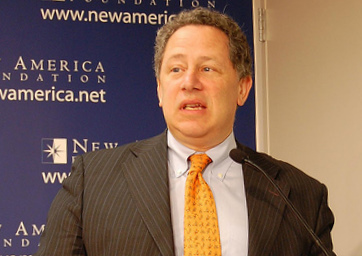
[digg-reddit-me]Matt Yglesias and Ezra Klein had 2 complementary points in posts yesterday. (Damn you, JournoList!) Yglesias:
…[L]ooking at this chart I think it’s hard to avoid the conclusion that Wal-Mart is the last thing we should be worried about. The worrying trend is the domination of the corporate landscape by super-profitable firms in the heavily regulated energy, banking, and telecom sectors.
Yglesias is making a point most commonly associated with libertarians that large firms often use the government — through favorable regulation, tax breaks and incentives, etc. — to increase their profits. For example, increasing the barriers for new firms in the industry and restraining their indirect competitors from direct competition. This follows the well-known principle that any government policy whose costs are diffused and whose benefits are concentrated will be adopted more often than not. Thus highly regulated industries tend to be dominated by a small number of large firms that make very large profits — because thanks to government regulation, there isn’t much competition. However, Ezra Klein observed:
In a competitive market, there’s really no place to make 27 cents on the dollar. Some other firm will come in and offer the same services for 24 cents, and then someone will undercut them at 19 cents, and so it will go until the profit margin narrows. Wal-Mart, for instance, has a profit margin of around 3.5 percent. Ah, capitalism.
Not so in the financial sector, though, which ever since deregulation has been posting higher and higher profit margins.
So, the exception to this trend is Wall Street — where deregulation has lead to higher profits. All of this seems quite intuitively true — both from a libertarian and from a liberal perspective — and even from a liberaltarian one.
The enormous profits taken out of every dollar (as seen in much of the the financial industry) is a demonstration of a lack of competition and thus a poorly functioning market. Of course, Goldman Sachs didn’t manage to make it on the list above — but it had more than double the amount of profit out of every dollar it took in as compared to each of the companies here. Goldman managed to take $0.26 of every dollar they made as profit to their shareholders. (And that includes the massive bonuses given to employees as expenses.) I think I need to see more data though to draw the conclusion that Klein is hinting at — that the deregulation of Wall Street increased it’s profits as a percentage of revenues — while deregulation generally has the opposite effect (as in the case of Wal-Mart).
Annie Lowery drives the point home in analyzing the 1Q results from Wall Street:
This is not quite a picture of a healthy industry. In a competitive marketplace, prices and fees at Wall Street firms should fall and margins should become thinner. On the one hand, Wall Street firms like J.P. Morgan and Goldman Sachs have seen a number of their competitors die in the past two years, and have absorbed business from the failed Lehmans and Bear Sterns of the world. But on the other hand, Wall Street profit margins have remained sky high except for a short blip during the worst of the credit crunch. And, an economist would tell you, such sustained levels of high profitability point to anti-competitive behavior…
[T]he profits point to a lack of competition. That is one thing the Dodd bill — via derivatives regulation — attempts to fix. Right now, Wall Street firms do not bid for big derivatives contracts — they simply quote a price and work over-the-counter. For that reason, derivatives are wildly profitable for the companies. The Dodd bill will force derivatives pricing to become public to the market, driving down margins as companies compete.
There’s a whole lot to unpack within these points about the nature of American capitalism and the government’s role in it.
But one key takeaway seems to be a repudiation of the most ideological take of either the left or right — and an acknowledgment that free markets are not merely what happens when the government is out of the way — but are created and maintained by a complex balancing act in which government regulates and participates. What you end up with is something less than socialism or libertarianism and more like liberalism:
Contemporary liberals reject the doctrinaire distinction between the “market” and the government that animated so much of the conflict in the 20th century. The free market should not be treated as some theoretical utopian ideal or as a perpetually lost state of innocence. And the government is not some evil force which must be reduced until it is of a size that it “could be drowned in a bathtub.” Rather the government and the free market exist together – and in a capitalist republic such as ours, each is dependent on the other. The free market does not exist in a state of nature but must be created by and maintained by the society and the state which provide the values and the rules and other conditions without which a market cannot be free. In other words, a free market is a product of a just government.
Follow-up post here.
[Image by f-l-e-x licensed under Creative Commons.]





